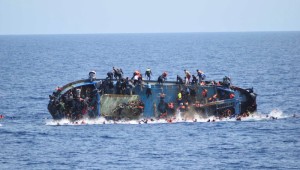
Some 180 young Ethiopian and Somali migrants, many weakened by hunger and drought in their home countries, were forced from a boat into rough seas off Yemen by smugglers on Thursday and 55 were presumed drowned, the U.N. migration agency said.
It was the second such incident in as many days off Shabwa province in southern Yemen, where 50 teenage African migrants were “deliberately drowned” on Wednesday by a smuggler who forced 120 passengers off his boat, the International Organization for Migration (IOM) said.
The IOM said it feared the incidents might mark the start of a new trend in people-smuggling that could lead to more deaths.
Twenty nine dead bodies washed up on the shore after Wednesday’s tragedy while twenty-seven others made it alive to the shore, it said.
“They were shocked, exhausted and quite desperate,” Laurent de Boeck, the IOM Yemen Chief of Mission, told Reuters in an interview in Brussels.
Smugglers were pushing migrants into the sea away from the mainland for fear of government boats, amid reinforced border controls, or to avoid encountering armed groups on shore in the war-torn country. They were then going back to Africa to pick up more migrants.
“The smugglers are panicking,” de Boeck said, but added that reinforced border controls along the coast could be having a counter-productive effect. “They (the smugglers) are basically continuing their business by killing people,” he said.
After migrants were forced into the seas on Thursday, the IOM counted five bodies. “Fifty are still missing from this incident, so 55 are presumed dead,” IOM spokeswoman Olivia Headon told Reuters.
“It may be the start of a new trend,” she said. “They drop them near the shore and turn around and get more.”
IOM officials spoke to 25 of the latest survivors, many in need of medical assistance and counselling support, she said.
“These people are really thin. There is an ongoing drought situation in Somalia and Ethiopia. Some may not have had much strength to make it alive to the shore,” she added.
The migrants reported that 100 other survivors had already left the beach.
Already this year 55,000 migrants have taken the hazardous route from the Horn of Africa to Yemen to seek opportunity in the Gulf region, IOM said. The majority of migrants are young males between the ages of 12 to 25 from Ethiopia, it says.
The route is popular because it is cheaper than others, but when they arrive migrants often fall victims to abuse.
Yemen itself is riven by a two-year civil war in which forces loyal to the Saudi-backed government are pitted against Iranian-backed Houthi rebels.
“It will continue to be a trend, the smugglers bring migrants; the Yemen war doesn’t stop them,” de Boeck said.
“Once they arrive though, there are other criminals waiting for them … they are trapped and tortured until their family pays.”
Rescue operations at sea and policing to clamp down on the situation are extremely limited in the region, he said.
“The difficulty is also that this is a criminal network which is organised not only in Yemen but also in Somalia, in Djibouti as well as Ethiopia,” he added.